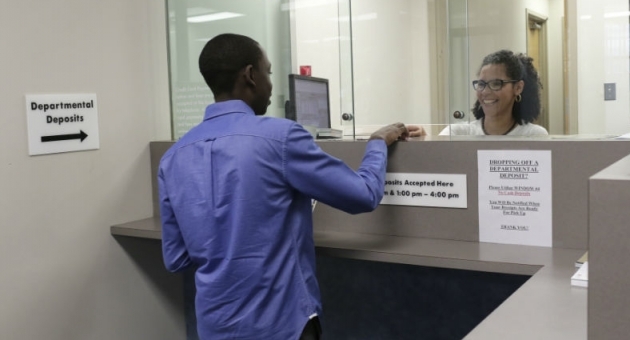Temple launches new service excellence initiative

We’ve all been one—a customer, that is. And as such, we all know the importance of great service. Likewise, we’ve all experienced poor service, which can range from frustrating to infuriating and leave you with a poor impression of the company or organization that’s delivering the service.
Over the past year, customer service at Temple has come to light on a number of fronts. Given the highly competitive higher-education marketplace, and the desire to create the best work atmosphere for employees and great experiences for students, families and alumni, Temple President Neil D. Theobald appointed a task force last fall to examine potential service issues and design solutions. The result is a universitywide service excellence initiative designed to transform the university culture into one focused on the user experience, whether that user is a faculty or staff member, a prospective or current student, a parent, or an alumnus.
“Temple is a university on the rise,” President Neil D. Theobald said. “Students come here for an outstanding education, and our reputation as a leading public research university is spreading. To continue our ascent, delivering superior service to each other and our students is vital.”
Research findings
Graduate students from the Fox School of Business Enterprise Management Consulting program were engaged to examine the issue through surveys, focus groups and individual interviews with faculty, staff and students conducted in the fall of 2013.
“We learned that there’s a lack of responsiveness in some departments when someone requests help,” said Jonathan Reiter, one of the students on the team and now a manager in Temple’s Construction, Facilities and Operations portfolio.
“We really listened and heard from the Temple community that the way we do business here can be unnecessarily complicated and inefficient,” said Katie D’Angelo, assistant vice president of administration and planning and a member of the service excellence task force.
On a positive note, the researchers found that the vast majority of Temple employees heartily support and embrace Temple’s mission, providing an excellent base on which to build the new service excellence initiative.
What is service excellence?
According to Susan Mudambi, associate professor of marketing and management information systems at Fox, great service can be defined as when a customer’s experience meets or exceeds that customer's expectations.
Further, she explains, it’s about the entire experience, rather than each individual transaction. Think about the companies that you believe are the tops in customer service. It’s not because of the pleasant way they greet you when you enter the store. It’s because of the greeting, plus the assistance they provide, the price and the return policy.
Culture change
To create solutions, the Fox research team examined the underlying reasons for the lack of service excellence across all departments at Temple and learned that they centered on the culture at the university, a lack of communication and some overly complicated processes, including those for hiring new employees and scheduling work with facilities.
Together, everyone who works at Temple creates the culture at the university. Therefore an important aspect of the new service excellence initiative is empowering employees on multiple fronts, including training and recognition for delivering good service (see sidebar on the service excellence initiative rollout).
Additionally, to underscore the importance of exemplary service, President Theobald has asked that a new essential function be added to the Performance Development System, explained Eric Brunner, assistant vice president of learning and development. The essential function provides a universal set of service excellence guidelines on such daily practices as greeting visitors and answering emails.
Improving communication and efficiency
Work to improve communication and efficiency began this past spring in several departments, including Human Resources and Facilities, and many are already seeing great results. In Facilities, for example, each work request that comes in is now confirmed received and assigned a work-order number via email. This effort is followed by a facilities manager or project manager personally contacting the customer regarding the status of his or her request. More transparent systems similar to this were already in place in Campus Safety and Computer Services, the two departments rated highest in the surveys conducted by the Fox research team.
Another piece to improving efficiency is making it easy to get help. This past month, the TUhelp channel launched on the portal and now includes six departments. The benefits are multifold: Colleagues know where their requests stand at all times, and departments can easily track their efforts to improve.
Work in progress
Both the Student Financial Services and Bursar’s offices have been examining their processes to identify pain points for students and develop ways to deliver better service. Time spent on hold was by far the biggest complaint. To remedy the issue, the Bursar’s Office piloted a call center starting in mid-July to answer and triage every incoming call. In the first eight weeks, the call center managed more than 3,600 calls with less than 9 percent requiring escalation to a specialist. Now the more simple questions get answered quickly by the call center, while students and families with more complicated issues can be connected with specialists and financial counselors.
Over the next several months, SFS and the Bursar will continue to survey students to help clarify other areas in need of improvement.
“What we’re really talking about here is exemplary service in everything we do, whether we’re interacting with each other or with students,” said Brunner. “Each one of us can make the difference between a positive experience and a negative one for a student, parent, colleague, patient or community member.”